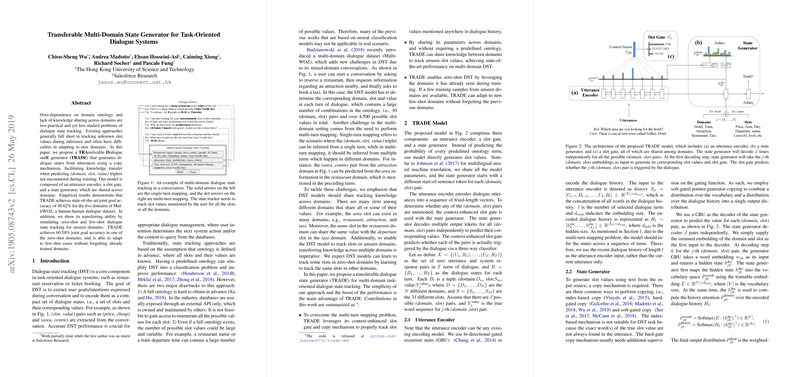Transferable Multi-Domain State Generator for Task-Oriented Dialogue Systems
The paper presents an empirical investigation into dialogue state tracking (DST) within the domain of task-oriented dialogue systems, specifically focusing on the limitations posed by traditional reliance on predefined ontologies and lack of cross-domain knowledge sharing. The authors introduce TRADE, a novel framework designed to enhance DST by predicting dialogue states using a generative approach that leverages a copy mechanism. This methodology enables the transfer of knowledge across domains, facilitating accurate predictions of dialogue (domain, slot, value) triplets, even when encountering previously unseen data during inference.
Model Architecture
The TRADE model features three core components: an utterance encoder, a slot gate, and a state generator. The model does not rely on a predefined ontology, addressing a significant challenge in traditional DST models which struggle to enumerate all possible values and adapt to the latent dynamism of dialogue interactions. The slot gate, configured as a three-way classifier, predicates whether a slot is mentioned and distinguishes between ‘none’, ‘dontcare’, or utilizing the generated value. The state generator employs a soft-gated copy mechanism allowing for the generation of slot values directly from utterances, a strategy that enables handling unknown or variable slot values over manually enumerated lists.
Empirical Results
TRADE outperforms established DST frameworks such as MDBT, GLAD, GCE, and SpanPtr across multiple metrics on the MultiWOZ dataset, demonstrating a state-of-the-art joint goal accuracy of 48.62% and slot accuracy of 96.92%. The nuanced mechanism of TRADE allows for substantial zero-shot performance, notably achieving a joint goal accuracy of 60.58% in the taxi domain, indicating significant cross-domain knowledge transfer. Furthermore, TRADE can adapt efficiently to few-shot learning scenarios, retaining its proficiency in previously trained domains while accommodating new data—an essential feature for dynamic real-world applications where comprehensive datasets may be sparse or expensive to obtain.
Implications and Future Directions
The research progresses the field of task-oriented dialogue systems by solving pressing constraints of ontology-dependence and portraying a scalable method for cross-domain generalization. The adaptable architecture of TRADE facilitating domain transfer is an asset for artificial intelligence applications consistently interacting with dynamic and multifaceted datasets. Moving forward, employing methods from meta-learning and exploring larger-scale datasets encompassing diverse domains could enhance TRADE's adaptability and generalizability further.
The success of this approach suggests broader implications for the architectural decentralization of pretrained models, potentially eliminating the ubiquitous need for predefined schemas in many NLP applications. The continued exploration into combining TRADE with external resources could further attenuate the zero-shot learning gap and probe deeper into unsupervised dialogue system optimization.
In conclusion, TRADE presents an innovative and effective approach to DST that stands to significantly influence ongoing developments in building more robust, flexible, and capable dialogue systems.
